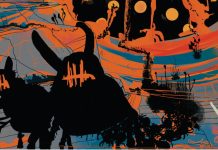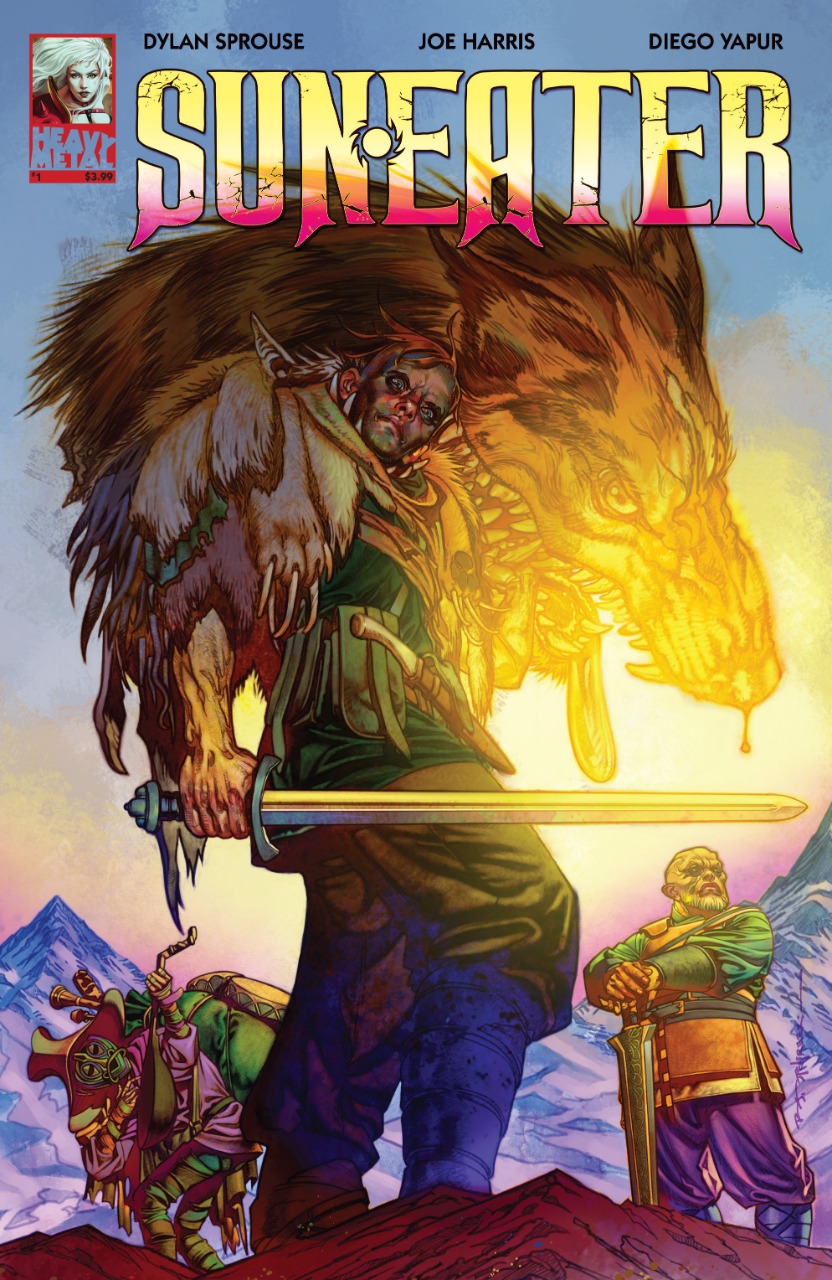

If showbiz history tells us anything, it’s that adult life is often unkind to child actors, but Dylan Sprouse has beaten the odds. After a long stint in the Disney factory on the Suite Life series along with his twin brother Cole (who currently plays Jughead on Riverdale), Sprouse took time off to work in a comic shop, learn how to make mead and do other things that helped give him perspective. A long time comics reader, Sprouse is now making his comics writing debut with Sun Eater, a Viking comic about Kveldulf, a warrior who sacrificed his leg to dark forces, only to struggle with the addiction to this powerful parasite.
Collaborating with co-writer Joe Harris and artist Diego Yapur, Sprouse is using this nine issue story tell a very personal, and painful, story. While we’ve talked to many celebrities turned comics scribes over the years, but you’ll never read an interview quite like this one.
SUN EATER is published by Heavy Metal with DIGA Studios and the first issues is available now.
[This interview has been edited for clarity and length. Thanks to Kris Longo and Joe Harris for their help.]
MACDONALD: You’ve been working on Sun Eater for a very long time. Obviously, you have a lot of different activities over the years, such as running your meadery. So why comics? Why did you want to tell this story in the comics medium?
SPROUSE: Well, that’s a good question. I think that comics is the most fitting format to tell the story that Sun Eater wants to tell, not just as the comic book fan that I am and I grew up being. I also really wanted to work with Heavy Metal because I feel like this was a publishing company who could really make it the right way. I think that there are limitations in a lot of other mediums and Sun Eater is kind of intentionally limitless in some aspects. I knew that it either had to be a comic book or an animated series. When I ended up meeting up with Heavy Metal, it was kind of the perfect union for me. I realized this is exactly who I’d love to be working with on this project.
MACDONALD: Was the visual aspect of it something that was part of the whole concept from the start?
SPROUSE: Certainly, yeah. Sun Eater in general, to give a little bit of a background is kind of light fantasy but some aspects are a heavier fantasy, but the actual visual style differs throughout the comic in terms of the palette of the juiciness of the images. I knew that dynamic switch had to be something that was either drawn or animated. It was kind of the natural progression.
MACDONALD: Awesome. So tell us a little bit about the story itself. I know it’s a Viking with a parasitic leg that gives them supernatural powers!
SPROUSE: So this character named Kveldulf – which is a mouthful, a lot of these old Saga names are quite difficult to say – in order to reclaim his son from his stewardship to the first king of Norway, Kveldulf actually sacrifices his leg to the gods in return for this great power, which happens to be a parasitic pelt which transforms into a werewolf. If you actually go back in history into the sagas, this was actually the first recorded Scandinavian werewolf story. So it is somewhat historically based. But I framed it in the light of it really being a story about drug addiction and how that affects a family dynamic. So Kveldulf is the protagonist or antagonist, depending on the way you look at it. He’s trying to go on a reclamation quest to undo the wrongs that he’s been doing for the last 10 years. And in doing so, he kind of bites off more than he can chew.
MACDONALD: Is this the start of a saga?
SPROUSE: Sun Eater will be Sun Eater. I’m a firm believer that good stories also know when to come to an end. I have a lot of ideas regarding the world and it’s lore and characters. It might be told eventually. However, this particular saga and its focus on Kveldulf comes to a definitive end at the end of nine issues.
MACDONALD: I like the idea of telling one story that really stands on its own terms.
SPROUSE: I always find that stories like that sit better in the mind of the reader and they get across what they need to get across. If I can’t do it and the length of Sun Eater, then things could drag on and get misconstrued. And I don’t want that.
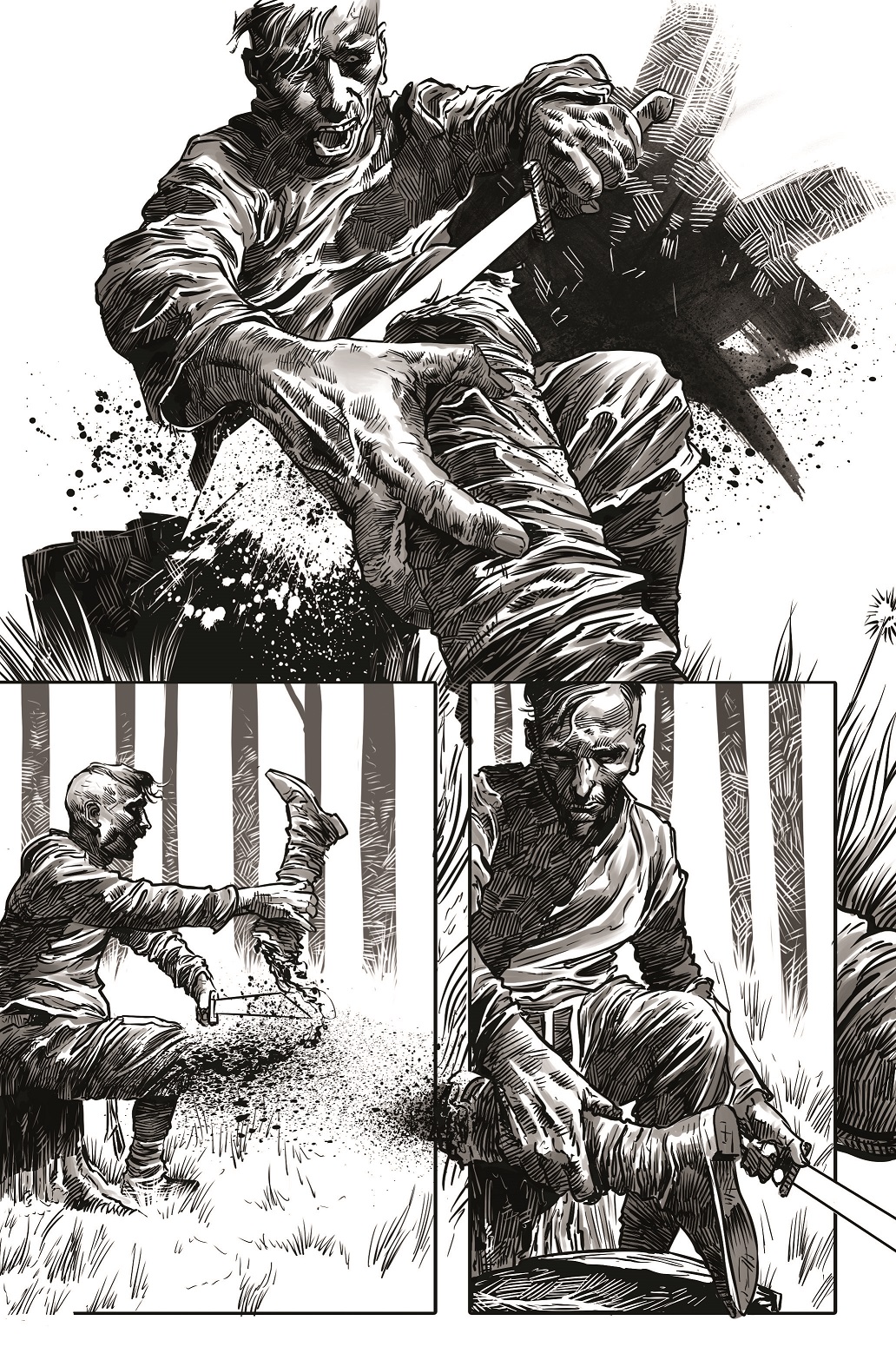
MACDONALD: You’re also working with Joe Harris as the co-writer and artist Diego Yapur. The art that I’ve seen looks spectacular by the way. How did you find Diego? He’s insane.
SPROUSE: I know, right? He’s brilliant. Diego was a recommendation through the Heavy Metal pipes. They actually they showed me a list of artists going into it, which was very exciting. I picked Diego because for obvious reasons, he’s amazing. But he’s also very, very good at capturing facial expressions. And coming from the acting side, I realized that in writing Sun Eater, I had written a lot of dynamic reactions to what was going on, and I felt like so much of the story of Sun Eater was being told by the character’s reactions. So I knew that that was super important to me. But his art style is also kind of dark and brutal and realist and that was super important as well, because for every bit of fantasy that Sun Eater is, it’s also very grounded and it’s weirdly human and it’s ugly and there’s no real moral good or moral evil in the story, it’s pretty much all moral gray area. An artist who could translate that into the actual [art] was definitely the choice. Diego stood out.
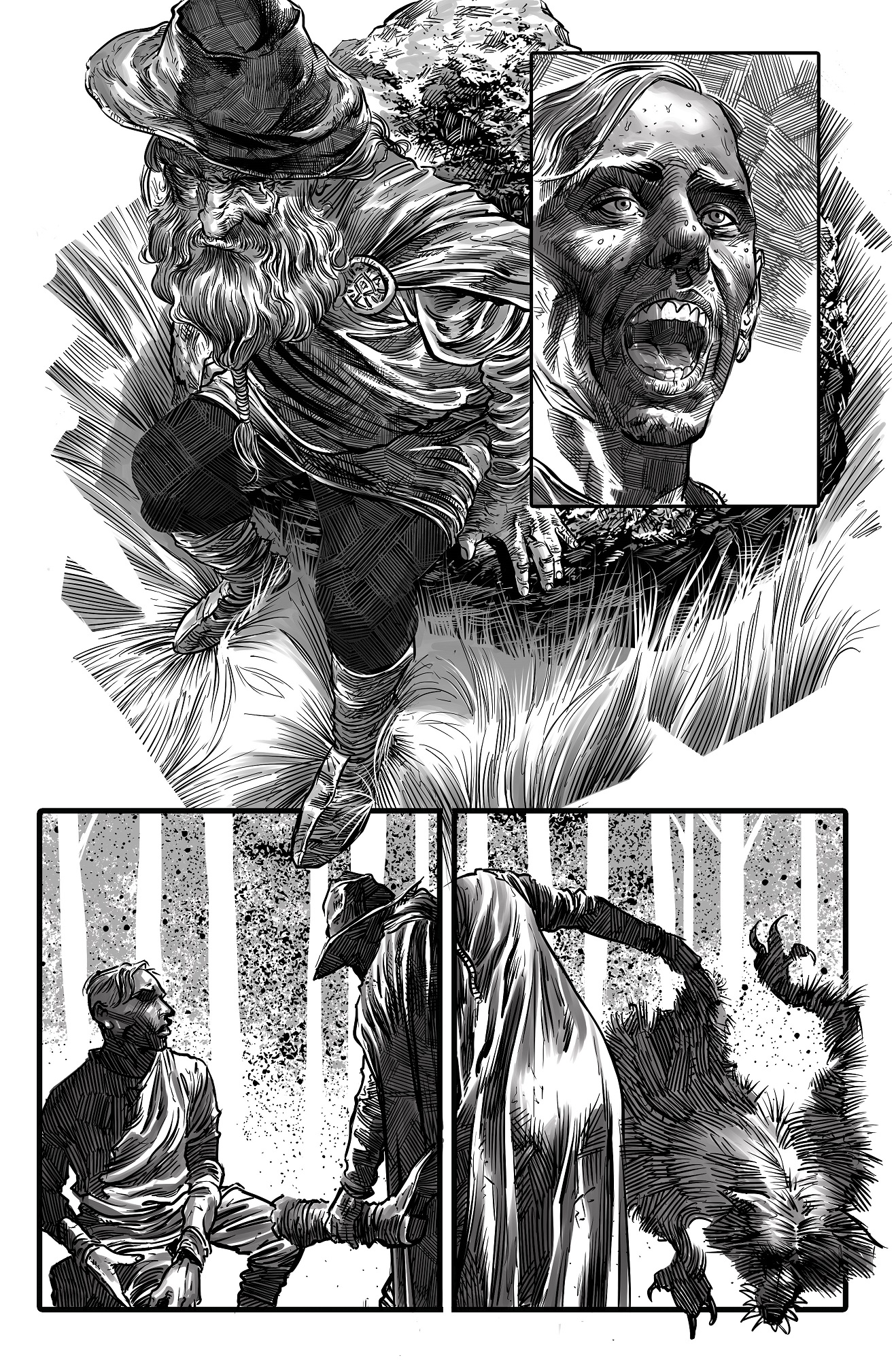
MACDONALD: That’s a good call – I used to edit comics and often tried to pick the artists who had the best facial expressions, like Pia Guerra on Y the Last Man. Capturing tiny little nuances of what they’re feeling that is so important in comics.
SPROUSE: Oh I totally agree. Y the Last Man was a major inspiration for me. Writing from the perspective of an actor, I was thinking a lot about framing and how close we are to the subject and how far we are or how distant we want to feel to some characters and a certain reaction. And Diego must be a movie buff because his compositions are very cinematic and for me it’s so easily translatable. I don’t know if this is of any importance at all, but I don’t think I’ve given Diego a single note, not even like contextual notes, things that you would need to give notes about. He just understands it. And sometimes it’s been, you know, I’m not a comic book panelist. I have no idea how to do this thing. Part of the reason why it’s so exciting to work with Heavy Metal on this team of very skilled workers in this regard, but Diego just translates what I was thinking onto the page. I don’t know how he does it, but he’s very talented. I can go on all day about him.
MACDONALD: Well, it is it is pretty exciting on that day when you first see that artwork and you see it’s what you’ve written. So I will confess, I’m always fascinated by when people come from other industries to get into comics because comics are such a tight community. Obviously you’ve done a lot of things in your life so far, but I’m just fascinated by that process because I do find talking to people that it’s very freeing. They find with comics, you can do so many things on the page and it doesn’t cost millions of dollars. You don’t have to think about the CGI costs. Was that also something that attracted you to doing this project in comics?
SPROUSE: Certainly. I think it was also a little bit of familiarity for me, too. You know, in terms of literature and comics, I tend to read material that’s very much like Sun Eater. I knew I couldn’t have restraints because going back to the drug addict narrative, Kveldulf as protagonist is very much representative of the hangover or the low. And then Gorm, the werewolf, is very representative of the high and the addiction. I knew that when it came to the addiction aspects, Gorm’s scenes had to be extraordinary. They had to be so juicy visually. They had to be frantic and violent and weird and sexual. And all of these things wrapped up into one. I started writing this as live action, but by the second episode, I quickly did away with it and rewrote the first episode. That was five years ago. But I had realized that everything about that was restraining the story as it needed to be told, I think for the reasons you listed. I think that is why maybe that space of comic books is such a freeing outlook for authors and writers and creatives in general.
But also I think that at the same time, the nature of the being so collaborative is very much like the film industry. There is also a greater degree of feedback that you can bounce off each other because it tends to a smaller unit or team. You’re not working on a film with four or five people, generally, you’re working on a film with hundreds. And with comics, if you vibe with the people that you work with, which lucky enough, I have, the degree to which you express your thoughts effectively on the page is much more concise and realized in a better way.
SPROUSE: Yeah. And, you know, for the record, it is personal, but I don’t shy away from speaking about it. Part of my releasing Sun Eater was finally coming to terms with it all and feeling comfortable talking about it. And I think, as you mentioned, comic books being such a such a good space for this kind of outlet, I felt like I knew I was going to be in an understanding community talking about things like this. So I don’t have any fear or I don’t shy away from it any more regarding this. This is very personal. Like I mentioned, Kveldulf is actually based on my mother and her own struggles with drug addiction. My mother was and is potentially–I don’t know any more in truth–been an addict for very, very many years. And, you know, bipolarity, drug induced schizophrenia, all of these things, growing up, I was experiencing. And for the record, obviously, that affects your family dynamic in a very vast way. As I was coming to terms with this into my adulthood, thinking about it, I was kind of yearning to do more writing. And so I thought translating it to a page, as I was writing it, I was coping with it or understanding it more. So this is, in a way, a fantasy realization of how I could have wished my own mother maybe would have acted or could have been or the things that I was fearful of seeing. And it’s all manifested inside of Sun Eater in a very personal way, but also with the expressed effort to hopefully be more universal than just a personal story, how to interact with people who experience the same thing and as a cautionary tale.
MACDONALD: [pauses] Wow. that’s pretty heavy.
SPROUSE: It’s super heavy. But it’s heavy because the nature of it warrants it. And there are moments in Sun Eater that are very lovely and very sweet and loving too. But the nature of that kind of thing is ugly and it’s scary and it’s pathetic. It’s all of those things wrapped up into one and the trials and just the journey that addicts by nature go on to get well or have some sort of reclamation, it’s a very difficult one. So I wanted to make sure that that was translated to some degree.
MACDONALD: You’ve said you are a fan of Scandinavian mythology because of your family heritage as well. How is that part of this?
SPROUSE: I’ve been obsessed with Scandinavian sagas and stories for as long as I’ve been alive. My grandparents and my father and my brother would talk about these kind of stories and so I felt that this heritage, with the personal nature of those stories being related to my family, it was the perfect setting for Sun Eater. It was actually kind of a direct dialogue to them. I found that this was the right place and the right time. And the tales boasted heroism told through probably a third party who was just chronicling the story, maybe fibbing and maybe making up things as they went along to embolden it. I felt like all of those aspects going in were kind of the perfect way to tackle this subject matter and the difficult nature of the universe, even the poetry that they would write this Scaldic verse or kenning, that’s all actually in here. So the dialogue that they speak is written Eddaic poetry.
MACDONALD: So I wanted to ask you to a little bit about your other endeavors, because I know you run a meadery in Brooklyn? I’m sure there is some curbside pickup in our future on that.
SPROUSE: We have a lot of online orders going out right now. As you can imagine, the alcohol industry has seen a spike in sales.

MACDONALD: But how did you start making mead?
SPROUSE: I’ve been brewing alcohol since I was 16, and it’s not a very romantic story. When I was 16, I wanted to get drunk with my friends. So I thought the best way to do it would actually be to brew it because you could legally buy everything to make it. So I got a home kit and I started brewing at 16 and I hid it in the garage. My dad found it was like, well, looks on you can do this so long as you do it respectfully and you enjoy the craft of it. I had already realized that I didn’t really like drinking it at that point, partly because what I was making was terrible, but I enjoyed the time frame it gave me. And I kept it up ever since. Coming out of college, I wanted to invest in a business that I was passionate about. So about a year and change ago, we opened up The All-Wise Meadery in Brooklyn and we made quite a little watering hole for ourselves. So it’s really cool. Mead is an ancient beverage and I wanted to educate people on that as well.
MACDONALD: Oh yeah, there’s been some mead making experiments in my larping family, but they never got very far. You are offering a special mead pack for Sun Eater as bonus, right?
SPROUSE: Correct. We released this very special new mead called The Short Mead, and it’s actually lighter in content than most of our other meads. Usually we aim to make mead anywhere from probably 11 to 13 percent ABB. But this one is sitting around 7 or 8.
MACDONALD: Wow, that mead gets the job done!
SPROUSE: Hey, we don’t fuck around when you drink.
MACDONALD: In another interview you talked about Black Hole by Charles Burns. I actually do another zoom cast and we talked about graphic novels, and I decided to talk about Black Hole, which I hadn’t read in a while. Rereading it, it’s always great. But of course, during a pandemic, it’s even better.
SPROUSE: I imagine! I should really reread it right now too.
MACDONALD: I feel like it’s still a little underappreciated at times. What was it about that book that spoke to you when you read it?
SPROUSE: The first time I read it, I was maybe 17, 16. I was working at Meltdown Comics on Sunset Boulevard. Rest in peace. It’s no longer Meltdown. When I started working there and I really had a hunger for reading graphic novels and comics in a different way than I’d been reading them and someone suggested I read Black Hole. First off, immediately visually, it’s incredibly enticing. But I think it was kind of just the dinner I needed to eat at the moment. It was talking about a subject that I had previously felt was a little taboo, too, and it really kind of opened the doors for me in terms of my digestion of content. I thought the ending was just such a beautiful, thoughtful way to end. I remember being so taken by it. I had it in my hand and I remember recommending it to five friends right after finishing it, like, I’ll buy it for you. So I went back into Meltdown and bought three more copies to give to my friends. It sits, particularly in my mind, as the one that really opened the door into looking at [stories] in a very different way. I think everyone has a moment like that where they realize that they’re used to reading content in a certain way and they come across something that kind of kicks down the doors for them.
MACDONALD: It is such a great work. They’ve been talking about making a movie out of it for forever but it wouldn’t improve the story at all.
SPROUSE: Although I’m sure that someone could do it in an interesting way, maybe harken to how good it is. But I think the nature of flipping the page and reading it that way, too, is so important.
MACDONALD: How did you like working at a comic shop, I have to ask?
SPROUSE: Back then Meltdown was just the heart of it. Meltdown on Sunset was such an interesting crossroads of diverse groups of people coming in to kind of digest this form . I was speaking to the most interesting people every day. And the funny thing is I got paid in comics. I didn’t realize that Gaston, who owned it and who is a dear friend of mine still today, was totally bamboozling me because I put way too much work in. But I took home like a stack of comics every day and I would read them all. I loved it because the amount of people that I was meeting and talking to in this way was really opening my mind up artistically to a lot of different points. But Meltdown was also not just comics. It was definitely comic centric, but it was a hobby store as well. And eventually Nerdist moved in and opened up their Nerdist theater in the back. So then there were comedians and talk shows and podcasts. It was just such an interesting hub. But a lot of my earliest memories from Meltdown were very interesting ones. I remember the floor manager must have had a sinus issue because every time that he sneezed, I’m not joking with you, strings of snot came out of his nose to his belly button. People were trying to be nice, I guess, but everyone just kind of gave him his space and pretended it wasn’t happening while he looked for a tissue.
MACDONALD: Are you saying they practiced social distancing?
SPROUSE: Yes! And that was one of my earliest memories. And then I would bag comics, like hundreds of comics a day just bagging, boarding and bagging boarding. I still look back so fondly, even though it was it was a lot of labor for a little payoff. I still I wouldn’t trade it for the world.
MACDONALD: That’s awesome. To wrap it up, are you going to do more writing? What else is on your table?
SPROUSE: This is my first comic book, but not the only thing I’ve been writing. I think that this was perfectly translated to comics due to the way it was written. But I certainly intend to do more. And I’ve talked at length with Heavy Metal about this and that. Regardless of what I do and when I do it, it will probably take some time because I just like to gestate on ideas for a long, long time. I’m a super fan of fringe lore and world building, but in the nature of that stuff it takes a little bit of time. So I want to make sure that anything I do is right and it tells a story and it tells it in the way that I feel most comfortable with. So yes, I will say that I will certainly be writing more, but no, it will not come soon. And Sun Eater has a lot more to tell.
![Suneater 9 Issues's Signed + Mead![1]](https://www.comicsbeat.com/wp-content/uploads/2020/05/Suneater-9-Issuess-Signed-Mead1.jpg)


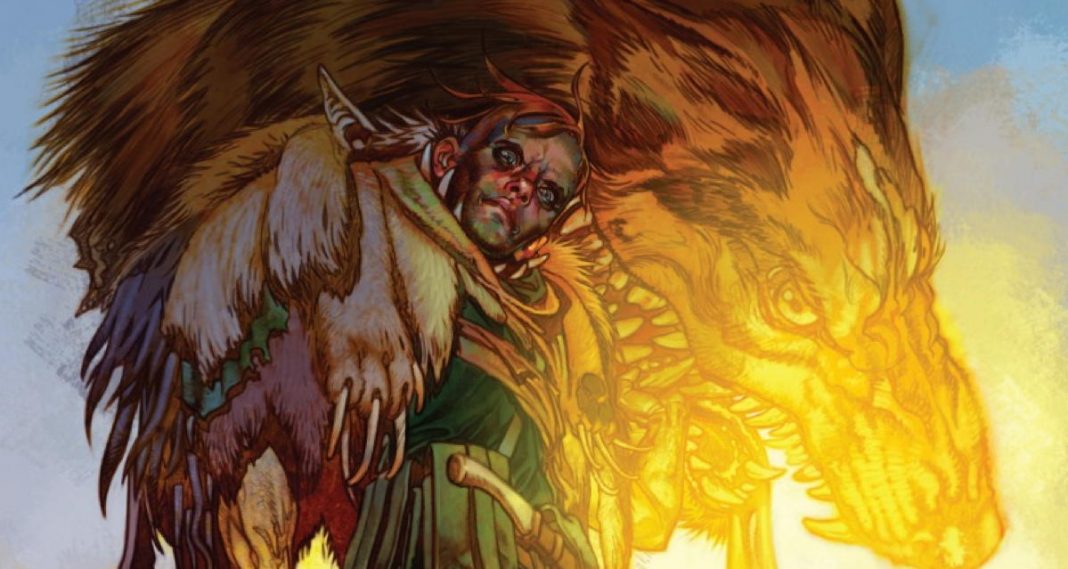
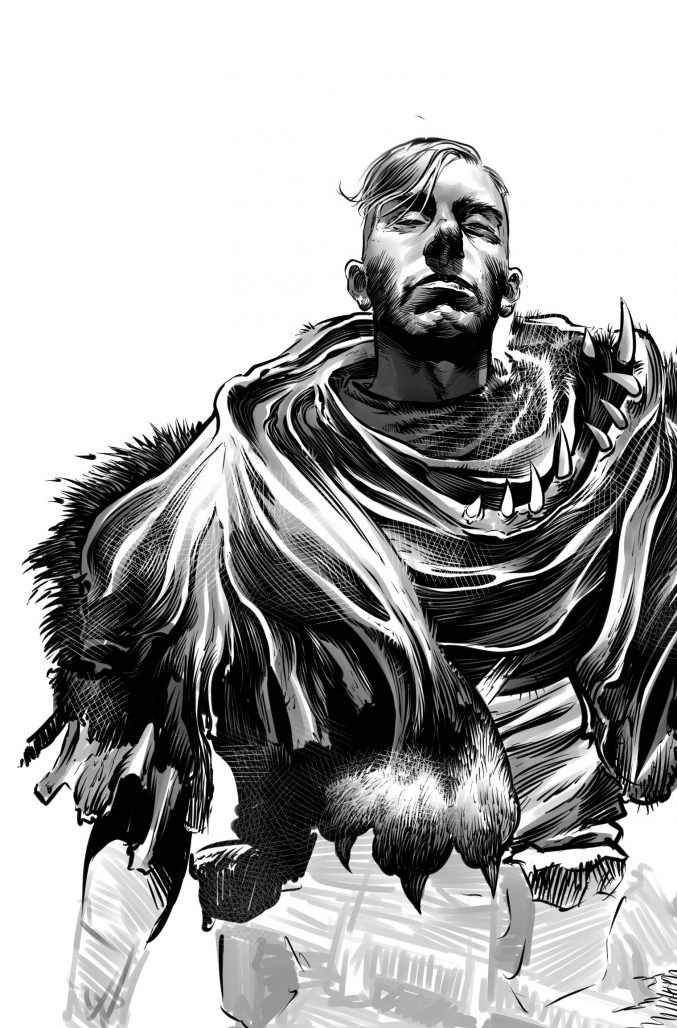
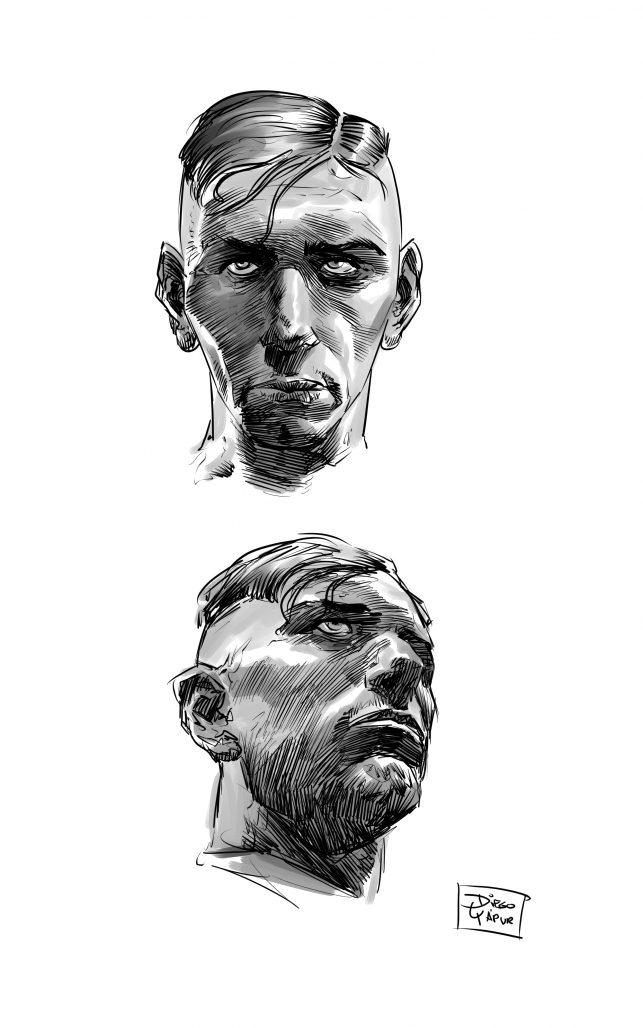
![Garm[2][1]](https://www.comicsbeat.com/wp-content/uploads/2020/05/Garm21-scaled.jpg)
